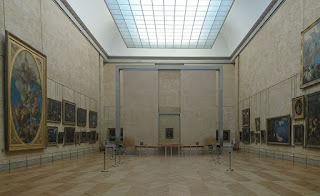Interpol, the DGSI & the French Police in the Roth Series
 |
| Ministry of the Interior |
The ROTH series is set in Paris and its principal characters are French.
They work in French law enforcement agencies — the French National Central Bureau of Interpol, the Judicial Police (the Direction Centrale de la Police Judiciaire), and the French Secret Service, the DGSI - General Directorate for Internal Security, which has a similar role within France to Britain's MI5. DGSI is located in a modern charmless building out in the north-western suburbs of Paris at 84 Rue de Villiers, Levallois-Perret.
All of these agencies operate very differently to their U.S., Australian or British counterparts.
French criminal procedure is also very different and fascinating, to me at least, perhaps because I trained and practised as a lawyer.
A short explanation of the agencies that play a role in the novels may be helpful. Interpol is an international police organisation that operates out of a state of the art facility in Lyon, in eastern France. Lyon is a command centre and data bank for the world's police forces, using what it describes as 'high-tech infrastructure of technical and operational support', to aid its 190 member countries in fighting crime. The city of Lyon is famous for Roman ruins and fine food.
Interpol's member countries are represented by their own National Central Bureaux, (NCBs) which often operate as part of the country's national police force.
Victor Roth works in France's NCB, located in the Ministry of the Interior building at 11 rue des Saussaies, 75008 Paris. Lyon and the NCBs employ experienced police and experts to carry out its investigations, but Interpol's criminal investigation officers do not have any arrest powers, nor do they carry guns.
In France there are two national police forces, the Judicial Police who are responsible for investigating serious crime, and the gendarmerie which handles the rest and also operates in the provinces. In ROTH, the Paris office of Interpol works with the Direction Centrale de la Police Judiciaire the ‘Judicial Police’, also located in the Ministry of the Interior building in Paris' 8th arrondissement.
 |
| Hyacinthe Rigaud, 'A French Magistrate of Requests' |
French police operate under the provisions of French Criminal Procedure which is an inquisitorial system and aims, unlike the English adversarial system, to arrive at the truth of what happened when a crime was committed, rather than putting the prosecution to proof of the facts.
In their investigations French police are responsible to either a prosecutor, examining magistrate or investigating judge, depending upon the seriousness of the crime. The judge, magistrate or prosecutor takes an active role in directing the investigation but usually leaves the leg work to the police.
The role of the police is to prepare a dossier of evidence, but at all times they must refer to the supervising prosecutor, magistrate or investigating judge who will, if necessary, interview witnesses or suspects under oath and issue authorities for searches and other elements of the investigation. You'll see in the books that Beck and Roth only go to the investigating judge when they want something.
The French system imposes a legal obligation on suspects and witnesses alike to give a full account of the facts and circumstances in which the offence occurred. At least during the investigation stage, that requirement removes the right to silence. Failing to fully co-operate can reflect badly on an accused person when the matter comes to trial.
That wasn't hard, was it? Now you can spout these fascinating factoids at dinner parties.



Comments
Post a Comment